Joint winner of the One World Broadcasting Trust Premier Award for network television 1994.
"Some of the most powerful multinationals in the world are oil companies. Increasingly their exploration programmes are targeted on frontier regions"
Commentary: In 1992, Channel 4 broadcast a programme, "The Heat of the Moment" which looked at oil-producing areas in 4 continents. Most public response to the film was provoked by events surrounding oil operations in Nigeria. Since "The Heat Of the Moment "was screened, Shell has found itself entangled in a battle between local communities and the military dictatorship of Nigeria, who have used brute force to protect the flow of oil on which their government depends. For 30 years the Ogoni people have quietly endured military oppression and have watched their environment become polluted by oil.
Now they have had enough. This film is their story.
"No to Shell!" "No to Shell!"
_________
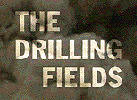
..."I'm the district officer in this particular area, the native authority treasurer sends his figures to me for checking against last years figures. When its decided what the tax is to be this year, I go off to tell the chiefs and people what they're to pay and why. Thats my wife, I spend so much time doing the rounds, that if she didn't come, we wouldn't see much of each other. We take our beds and everything else, as the rest houses where we spend the nights have no furniture"
Commentary: Nigeria was Britain's largest African colony, a nation conceived by and for European economic interests. 250 ethnic groups were herded into one country in 1914. The British appointment of puppet rulers, has led to a succession of Northern dictators dominating Nigeria since independence in 1960.
The Anglo-Dutch company, Shell, struck oil on the Niger Delta in Southern Nigeria in the late fifties. Oil soon became Nigeria's largest source of revenue and was the central issue in the Biafran civil war in 1967, when the oil rich eastern region tried to break away from Nigeria. The rebels surrendered in 1970 after 1 million people had died either through warfare or famine. Since the boom of the seventies, when oil exports earned 100 billion dollars, people from the oil-producing areas have seen money pouring from the delta into Lagos , where it has been concentrated in the hands of the military.
Resentment has grown towards Shell and other oil companies, who are seen as being in league with the dictatorship. Shell, now one of the world's largest multinationals, accounts for 50% of Nigeria's daily oil production. Although 95% of Nigerias foreign earnings comes from oil, the Niger delta remains poor. 6 million people depend on its fertile fishing grounds and agricultural land, which are under threat from oil pollution
Ken Saro-Wiwa is a prolific writer and publisher, he is popular leader of the 500,000 Ogoni people, leading a campaign against the activities of the military government and oil companies, who he feels have exploited his people
Saro-Wiwa
"The Ogoni are a farming and fishing people, they have lived in a very fertile area that produced most of the food that was eaten on the delta proper for a very long time. Shell found oil in the Ogoni area in 1958, since then they found about 6 oil fields in an area that has the highest population density in Africa which is about 1,500 people per square mile"_________
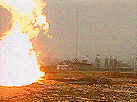
Commentary: For the last 30 years, farmers have had to compete with oil companies for the limited space available. Ogoni land has yielded about 30 billion dollars in oil revenues, however, most of the people are living in poverty. The environmental cost of oil production has been high. At Ebubu in 1970, a Shell pipeline carrying crude oil spilt onto farmland. As a clean-up measure, the oil was burnt leaving a semi-solid crust 5 metres thick.
Saro-Wiwa
"What we are walking on now is crude oil not soil. This land is lost forever, for the next thousand years nothing is going to grow here. You're a doctor a medical doctor, all this must have had a terrific impact on the people of Ebubu?"Dr Olua O Kamalu
"Exactly, you can see because when the sun hits this thing it melts and it evapourates into the atmosphere increasing the carbon dioxide and carbon monoxide content and you know if you live purely by rainwater, since this stream, you can see has been completely destroyed. So, the chemical now the carbon monoxide and the high concentration of carbon dioxide gets dissolved in water and what they drink is acid water."Saro-Wiwa
"I understand they have awarded contracts for the clean up of this place and the place is supposed to have been cleaned up. Infact in their books it has been cleaned up twice".Dr Olua O Kamalu
"Well you have seen it for yourself whether this place has been cleaned, you can see it."Commentary: Despite being approached for an interview, Shell declined to take part in this programme. At Korokoro flow station, Shell have been careful to protect their machinery with fencing, but no fencing protects villagers from the poisonous waste which is released only a few minutes away from their homes.
Dr Gary Leton, Ex- Chancellor, Rivers State University
"We were known to be good farmers, we produced a lot of food, infact we were supposed to be the breadbasket of the state, but now we are importing food, not producing enough again for ourselves. So we feel the effect of hydrocarbons, these gases in the atmosphere, its affecting us, affecting our health, affecting our crops and affecting the whole environment"Saro-Wiwa
"What you see behind us here is the sort of experience that the Ogoni people have to live with all their lives. This spill has been going on for the last 6 weeks. This sort of pollution to live with it in an area where land is in very high demand is completely destructive of the community"Osaro- O Gboro Okochi, cassava farmer, Eleme
"This is the entire farm I have. I have nowhere else where I can grow food to eat and I have 9 children, 2 have already died. You should not get annoyed, but you should tell Shell to come home so they can settle this problem, this problem of spillage is common here in Tai, Gokana and Khana. This is how Shell has been treating everyone here"Chief GNK Gininwa, Korokoro
" When crude oil touches the leaf of a yam or cassava, or whatever economic trees we have, it dries immediately, its so dangerous and somebody who was coming from, say, Shell was arguing with me so I told him that, I'm sorry my dear, I know that you're an engineer, you have been trained, you went to the university, I did not go to university, but I know that what you have been saying in the university sleeps with me here so you cannot be more qualified in crude oil than myself who sleeps with crude oil"Commentary: Between 1976 and 1991, on the delta as a whole, official figures quote 2,976 oil spills, which averages to almost 4 every week, amounting to 2.1 million barrels. According to the Ministry of Petroleum, most spills were caused by such factors as equipment failure and corrosion.
Although The Nigerian High Commission in London were unable to give us an interview, they did make this statement.
'It is true that the exploitation of oil by some of the multinationals in our country has its environmental consequences.However, the multinationals are the same as those exploiting oil in other parts of the world. They can, therefore be said to be reasonably aware of the environmental hazards and the need to take remedial measures both precautionary and curative. Ogoni land is one of the first places in Nigeria in which oil prospection was undertaken. It is, therefore, true to expect that the environmental impact could be more pronounced'- Alhaji Abubakar Alhaji, Nigerian High Commissioner, London.
Commentary: Despite the danger of blowouts, pipelines cut through the village of Kegbara Dere.
Martha Naakuu, Kegbara Dere
"Shell has taken away our village, we have nothing in the farms anymore and they don't pay us, all our yams are gone, we are hungry, anything we plant does not yield, they pass their pipes over our farmland, when there are oil spills they refuse to pay compensation. If they don't want to deal with us, they shouldn't come to our village"Chief GNK Gininwa, Korokoro
"Shell is a multinational company, they are being supported by the federal government so its little or none we can do, we don't have anybody here, our children are not going to school for us to graduate into anything. We are not staff of Shell company, we are not in the federal government. So, even if we send our papers they are all ending up in wastebasket. So nothing no reaction. What do we do? are we going to carry gun? Are we soldiers? We don't have that power and we are very law-abiding citizens, so we don't resort our differences by violating or fighting. If we do that they will kill all of us "_________
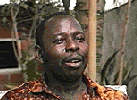
Saro-Wiwa
"On occasions, when villagers have protested against the activities of Shell, the Nigerian police have been called in very swiftly and sometimes with fatal results to the protesting villagers. So, we have been to a very large extent powerless, powerless in the context of Nigerian politics where a small group of people, a minority who have no protection under the constitution, because its the organised banditry which goes in the name of government in Nigeria does not provide for minority rights at all"Commentary: This is the village of Umeuchem, 10 miles from Ogoni, where a neighbouring ethnic group, the Etche, held a protest against Shell. This devastation was the result of the brutal suppression by the Nigerian mobile police, of their peaceful demonstration in October 1990. These pictures were filmed a year later, with the village still in ruins. According to the resulting judicial inquiry, 495 houses were destroyed and an estimated 80 people killed.
This villager wished to remain anonymous
Witness
"The people demonstrated because they had seen Shell continually exploit their land without adequate compensation in any form, in the form of paying for the land, crops or providing basic social amenities"Commentary: The judicial inquiry points out that "The present system, whereby oil companies negotiate settlements with native illiterate villagers always ends in an unfair and unequal deal for those farmland owners"
Witness
"The demonstrators on the first day of the incident ate oranges, drank palm wine, exchanged alms of friendship with Shell police and their workers without knowing that Shell had secretly invited the Nigerian police"Commentary: Shell's letter to the state commissioner of police warns of an impending attack from the villagers on its operations and urgently requests protection by preferably the mobile police. However, the judicial inquiry found no evidence of a threat from the villagers.
Witness
"They just leashed terror on the peaceful demonstrators and started killing and maiming whoever came their way and in the process so many villagers died. As if that was not enough, the following day, more mobile policemen regrouped, arrived at the village with armoured car, with all dangerous explosives, with all sophisticated weapons and started burning all the houses in the village, cutting down all economic trees, killing anybody they see and burning those they killed"Commentary: The commission recommended the prosecution of those police officers responsible for the killings, however, none have been brought to justice by the authorities
Shehu Othman, oil analyst
"I have no reason to doubt that Shell does get the state to intervene on its behalf whenever it is in conflict with the communities in the oil-producing areas. Considering the strategic importance of oil to the Nigerian state and nation, the willingness of the state to draft police, armed police whenever there is a conflict is a testimony to that"Commentary: Despite the experience of Umeuchem, protests against Shell escalated. Other ethnic groups voiced their concerns. For the first time on the delta, an international campaign began attracting worldwide attention. This was the movement for the survival of Ogoni people which was spearheaded by Ken Saro-Wiwa
Saro-Wiwa
"The Ogoni people have now decided to make a last ditch stand against the government and against Shell that hve ripped them off for the last 35 years."Crowd
"WE WANT FREEDOM!"Commentary: Ken Saro-wiwa is president of the Movement for the Survival of Ogoni people, known as MOSOP. The Ogoni people had issued an ultimatum to Shell and government, demanding royalties from the oil and compensation for environmental damage suffered since 1958. They had received no reply.
Saro-Wiwa
"MOSOP is at this moment busy mobilizing Ogoni people, creating an awareness among them, for the dangers which threaten them, from the point of view of the environmental degradation and the pollution of Ogoni land and also the political marginalization and what to do about it"In early 1993, the year of the worlds indigenous people, the movement became fully motivated
Ogonis celebrated their peaceful campaign with Ogoni day, when 300,000 people took part in marches in all 6 kingdoms.
_________
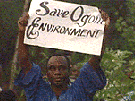
Banner reads: 'Ogoni day 1993, International year of the worlds indigenous people' 'Save our environment' 'Kegbara dere for MOSOP'
Saro-Wiwa
"Ogoni day in 1993 was a most exhilarating experience for me. It was wonderful to see a people who had been docile for so long. It was good to see fear no longer a part of them and on that day when I saw the large number of people streaming into Bori from their various villages, I really felt a sense of fullfillment. If I had died the day after that, I would have died a very happy man indeed"_________
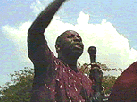
Saro-Wiwa
"From today onwards, Shell is declared Persona non grata in Ogoni"Crowd
"No to Shell"Commentary: In January 1993, a Shell worker was badly beaten, so staff were withdrawn from Ogoni, resulting in the closing off of 28,000 barrels of oil per day. In February, Shell held a meeting in London to discuss the deteriorating situation, the memo of which specifically referred to Saro-wiwa.
'...Ken Saro-Wiwa is using his influence at a number of meetings, last year in Geneva at the UN Commission on Human Rights....PA departments to keep each other more closely informed to ensure that movements of key players what they say and to whom is more effectively monitored to avoid unpleasant surprises..'
Shell were most concerned that international campaigning arising from the Ogoni situation could harm their reputation. In April, Saro-Wiwa experienced continued harassment from the military authorities, he was arrested twice and released on both occasions.
Saro-Wiwa
"The United Nations recognises the rights of all the worlds indigenous people. Indigenous people have been cheated through laws such as are operated in Nigeria today, through political marginalization they have driven certain people to death. That happened in America and in Australia. They are trying to repeat it in Nigeria and we do not want it. We say no! [repeat] In recovering the oil that has been stolen from us, I do not want any blood spilt, not of an Ogoni man, not of any strangers amongst us. We are going to demand our rights peacefully, non-violently and we shall win" "yes!"Saro-Wiwa
"On 30th of April 1993, Willbros, the American contracting firm, were laying pipelines for Shell, in Ogoni territory and we had noticed that they were accompanied by soldiers. Mrs Korgbara is a farmer, and when she noticed that her farm was being bulldozed, she turned up with a number of other farmers to question why this was happening"Karalolo Korgbara, Biara
" My farm was destroyed and I was retrieving the remains. When I went there to gather what they'd destroyed, they shot my arm and severed it. There is nothing I can do now, I can't farm. They've paid me no money, they have done nothing. They brought alot of soldiers who shot at us, injured us because of something we own"Commentary: After the shootings, there were 4 days of protests. On the last day one of the protesters was shot dead. Amnesty International was critical of the way the soldiers had been used to suppress the crowds.
Saro-Wiwa
"Our struggle is non-violent, but even if the Nigerian government were to bring a gun, brought with policemen or army to shoot us when we are protesting, if they shoot 10 people today, tomorrow 20 more people will come "_________
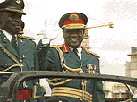
Commentary: General Babangida, Nigeria's dictator, had been in power since 1985 through a coup d'etat. Although he had promised an end to military rule and a return to democracy, the Election had been postponed 3 times and all political candidates had to be screened by him. Increasing discontent, forced him to set the election date for June 12 1993. Ogonis, through Saro-Wiwa's leadership, decided to boycott the election, as the constitution does not recognise minority rights.
On election day, Ogoni youths barricaded roads and seized ballot boxes.
[barricades read: 'no election' 'no 1989 constitution, love Ogoni or leave us alone']
"The reason why we shouldn't vote now is because of the fact that if we vote we're voting for aspects of accepting the constitution of Nigeria, which section 42, sub-section 3, states that all mineral resources, everything in each of the lands, belongs to the federal government and that is what we are not in support of and we know that if the president is elected into power automatically he is going to swear in this constitution, and even plan it like that and we don't want a situation where that constitution will still be imposed on the Ogonis"
"Now why don't you vote first and later on negotiate with whoever is President?"
"No!!"
Commentary: Nigeria was in a state of chaos when Babangida annulled the results of the presidential election, because of what he called malpractice. The military's broken promise of a return to civilian rule caused widespread rioting. Babangida accused Pro-democracy activists of being unpatriotic, and a clampdown began.
Babangida
"They threaten fire and brimstone, they tred the path of confrontation and sometimes treason..."Commentary: Saro-Wiwa's passport had been confiscated on the eve of the election to prevent him from attending a UN human rights conference in Vienna. On 21st June, he was arrested by 15 armed security agents. It was feared that the government would charge him with treason, which was punishable by death.
This action outraged the Ogonis and large scale protests demanded his release. As Saro-Wiwa's health deteriorated, Amnesty International declared him to be a Prisoner of Conscience. After a month of extensive national and international pressure, he was eventually charged with sedition and released on bail on July 22nd.
[placards read 'viva Ogoni!' 'why harass Saro-Wiwa' 'MOSOP is non-violent]
Commentary: As tensions on the delta increased, the government dispatched soldiers to seal Ogoni off, then on 30 July, Ogoni police were mysteriously drafted away from the area. 5 days later, the Ogoni town of Kaa was attacked , the military described the incident as an ethnic clash between the Ogonis and the Andonis, but both sides denied any dispute existed. As an ethnic group, Andonis are greatly outnumbered by the Ogoni and relied on selling their fish at Kaa market which was destroyed in the attack.
_________
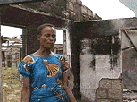
Danu Mark, Kaa
"Before the attack, before the armed men came in to kill us, the policemen from here were ordered to leave - so there was no one here to attack them. Everything was destroyed, my home was burned to the ground. There is no market, I am living just like this, it is only by the grace of god. There is nothing I can do. There was no quarrel between the Ogoni and the Andoni. This was all designed by the government"Saro-Wiwa "What weapons you say they used?"
Moses Deekor "Heavy weapon, dynamite and grenade"
Saro-Wiwa "grenades?"
Deekor "..they throw it..house catch fire..empty house we ran away"
Saro-Wiwa "You had nothing at all"
Deekor "Nothing we didn't think of anything fight ..we were surprised to see that so we had to run away and they start to kill this number of people..245 people"
Saro-Wiwa "245"
Deekor "Yes sir"
Saro-Wiwa "At what time did this attack start?"
Deekor "It was 11:30 till about 5 '0'clock in the evening"
Saro-Wiwa "Till 5pm..can you estimate the number of them of them who came here?"
Deekor "No, when the thing happened we ran away..number of people..you cannot stand and count"
Saro-Wiwa "I see, large numbers"
Commentary: Amnesty International believes that the removal of Ogoni policemen from the area and the failure to restore order in Kaa, suggest the military supported the attack. Due to growing discontent in the wake of the annulled election, Babangida was forced to resign. However, the military remained in control and on 26 August, a former director of Shell Nigeria, Ernest Shonekan, was installed as interim president.
Shonekan
"..do solemnly swear that I will faithful and bear true allegiance to the federal republic of Nigeria"Commentary: Rioters in Lagos demanded a return to democracy. On the 15 September, a series of unprovoked brutal attacks on 10 Ogoni villages resulted in the deaths of a further 750 people and left 30,000 people homeless. Houses and property were burnt and economic trees cut down. The harrowing footage you are about to see, was filmed in Kpean by Ogoni people a few hours after the raiders had left.
Eyewitness 1
"My fathers name is Efale Wakina, I was standing and I was hiding with my father, so before I know they started shooting. I was running then they were shooting all around, and they killed my father inside, so I ran. Before I could come back to see they have killed him and cut off his 2 legs"Eyewitness 2
"As I was hiding here, looking to see what was happening, they whistle, their commander whistled. I attempt to count them, there were over 500 but i could not give the correct number, they whistle with a different language, they did not even use the Andoni language"[scrawl on wall'don't come..?]
Saro-Wiwa
" I think that it was a military punishment for the Ogoni people because the traditional enemies of the Ogoni people had become very upset about what the Ogoni people were doing in protest against the destruction of the environment and the political marginalization of the Ogoni people, so this was to teach them a lesson I presume"_________
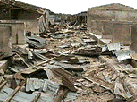
[scrawls on walls: 'Saro on Friday we shall hold responsible and Mr. Constance Wiwa tomorrow morning' 'I must attack the Ogonis' 'Ogoni kingdom you try' 'take 2 saro-wiwa']
Professor Claude Ake, UN World Commission on Development and Culture
"I don't think it was purely an ethnic clash, infact there is really no reason why it should be an ethnic clash and as far as we could determine, there was nothing in dispute in the sense of territory, fishing rights, access rights, discriminatory treatment which are the normal causes of these communal clashes"Commentary: The military government appointed Claude Ake as head of the commitee to look into the causes of the attacks, but while the professor was at a United Nations Conference, a Peace Accord was drawn up involving 4 representatives from the communities involved, the state government, security agents and Shell.
Professor Claude Ake
"It was done with unseemly haste, there was no attempt to show any humanitarian concern for those who were wounded those who were displaced. No programme of rehabilitation and they just told people well stop fighting thats it go home, in particular I felt that we should have looked closely into the intensity of the fighting and the military sophistication of the conflict because this did seem to suggest that what was involved was more than a community conflict. One could not help getting the impression that there were broader forces which might have been interested in perhaps putting the Ogonis under pressure probably to derail their agenda "Commentary: Although the Nigerian High Commission in London were unable to give us an interview they did make this statement.
Alhaji Abubakar Alhaji, Nigerian High Commissioner :
'Fortunately, there are well-meaning persons among the Ogoni community who realize that violence does not pay. This view point is very strong but is being played down by the militants among the pro-violence elements who not only intimidate and terrorize their fellow communities into submission but also put up a false innocent image in embarking on an international campaign alleging genocide being committed against their people.'Commentary: One of the peace accord declarations was for a resumption of economic activities. Saro-Wiwa refused to sign, as he was opposed to Shell restarting oil production and demanded a commission of inquiry into the massacres to allow a lasting peace. 3 weeks after the peace accord, Shell claim that they received a phone call about a fire outbreak at Korokoro flow station. Despite tension in Ogoni, Shell sent in firefighting trucks to check their property.When they arrived in Korokoro, villagers were suspicious as there was no fire. They denied the team access to the flowstation. A letter from Shell to the Rivers state governor claims that the fire trucks had been seized, and that a second team sent by Shell were victims of an attack by the community, claims which the villagers strongly deny.
'We regret to inform you of the attack on the team comprising 24 armed personnel and 2 drivers which went to Korokoro to dialogue with the chief of the community'
Commentary: One villager was shot dead, 2 other villagers including a 72 year old man, sustained serious bullet wounds. Many others were beaten.
Paul Sunday
"My name is Paul Sunday. We were at home on the 25th of October last year so some people came and started shooting that was all, we were not having quarrel with any neighbouring village, when they came they start shooting. "Commentary: According to Shell "The team exercised extreme restraint, in the face of the attack...'. The dead villager, Uebari Nnah, only 18 years of age was given a heroes funeral.
[grave reads: 'late Mr Uebari Nnah was shot dead on 25th Oct, 1993 by Nigerian soldiers at Korokoro-Tai]
Shonekan
"I will take the most honourable and dignified step of resigning with immediate effect"Commentary: On November 17 in yet another coup, interim president, Ernest Shonekan, was replaced by the defence minister, General Sani Abacha, who was seen as the real power behind the many previous dictators.
Abacha
"I have had extensive consultations within the armed forces here and other Nigerians in a bid to find solutions to the various political, economic and social problems which have engulfed our beloved country"Commentary: On December 12th, raiders, this time said to be from the Okrika community, attacked an Ogoni settlement in Port Harcourt. 63 people were killed and houses were destroyed using explosives and machine guns. The 2 day attack took place less than 2 miles away from state police headquarters. Yet they did not intervene to help Ogoni people, many of whom had been made homeless by previous attacks.
_________
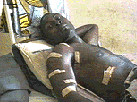
"You have no place to stay" "yes, no place" "This thing happened which time?" "One 'o clock in the night" "Which night was that?" "Monday night" "What happened" "I came back from work, fire burn my house and all my property..?" "Which day be that?" "Last Sunday, I came by the house Monday morning" " Was fire accident or people cause it?" "People cause it"
Commentary: Ogoni week was planned for January 1994, to celebrate their cultural festival and mark the end of the UN year for indigenous peoples. However, the military prevented it from taking place, except for the church service which was surrounded by soldiers.
[singing 'Onward christian soldiers']
The guest of honour was missing....
Saro-Wiwa
" I woke up in the morning and found there were troops at my gate. My chauffeur alarmed at the presence of the soldiers tries to lock the gate but then they order him to come out and I watch as 3 blows are rained on him and he's finally kicked in the stomach and is lying sprawled on the floor. They finally gain entry and infest the area making sure that I do not go out and no member of my family, my household gets out. All day and all night for 3 days I have to suffer this particular inconvenience, but I guess I'm used to it and I expect a lot more of it"Commentary: On January 19, at Saro-Wiwas invitation, the military visited Ogoni in an attempt to begin a dialogue and put an end to tensions in the area.
Lt. Col. DM Komo, Military Administrator of Rivers State
"We want to ensure and we want to, we appealed the last time and I'm still appealing now, that most of the demands of the various communities, including yours, can be met by the government, but that can only be met if there is a climate of peace and fears and suspicions are removed from our minds"_________
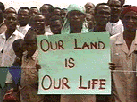
[placards read: 'pollution kills Ogoni', 'our land is our life']
Don Etiebet, Petroleum Minister
"And we want to take this opportunity to assure you that your problems are our problems, we want to take this opportunity to tell you that government is not oblivious of the several invitations that have been emanating from these communities and that government is determined to bring all these disruptions of activities in this area to a halt in no distant future"[placard reads: 'rehabilitate Ogoni refugees']
Saro-Wiwa
"On behalf of the entire Ogoni land, its chiefs, people and spirits and on behalf of the movement for the survival of the Ogoni people, MOSOP, I say, welcome to our shell-shocked land"Commentary: There is still no end to the pollution and the repression. This blowout occurred in the village of Kpor, the smoke from which can be seen at the funeral of Baritonle Kpormon, aged 29, who was shot by soldiers at one of the checkpoints which still riddle Ogoni.
Saro-Wiwa
"The struggle itself is about hope. If I didn't think there was hope in the future, I would not be encouraging anyone to struggle the way we are doing now. Its a rich land, its well-blessed. If we can get the oppressors out of the way, if we can get the pollution to stop, I am sure that Ogoni would be a happy land"
[repeats]
- song:
- "Be proud, be proud, Ogoni people be proud
- We shall no longer allow the world to cheat us"
On the night of the UK broadcast, announcement after credits over still of Ken Saro-Wiwa was as follows:
"At 1 a.m. this morning, Ken Saro-Wiwa was abducted from his home by the Nigerian military. His whereabouts are unknown."
Commentary - Cathy Tyson
Voice-overs - Michael Kitchen and Godwin Poi
Original Music - Mark Hawkins
Graphics - David Ward
Rostrum Camera - Ken Morse
Archive - BBC, COI, Greenpeace, Ken Saro-Wiwa, NTA, National Film Archive and Reuters TV
Thanks to - Richard Boele, Shelley Braithwaite, Gemini Audio, Raman Kaushal, Lyton Aviation, M2 Facilities, Platform Film & TV, Profile Video and RNTV
Camera - Kwiku Arthur
UK Camera - Guy Newton and Denis Cullum
UK Sound - Ant Spring
On-line Editor - Brian Allen
Dubbing Editor - Lance England
Production Accountant - Patrick Browne
Production Manager - Simon Gray
Editor - Sally Hilton
Writer/Researcher - Kay Bishop
Producer - Poonam Sharma
Director - Glenn Ellis_________
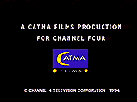
A Catma Films Production
First shown on Channel 4, London on 23/5/94
ęCopyright 1994
Joint winner of the One World Broadcasting Trust Premier Award for network television 1994.